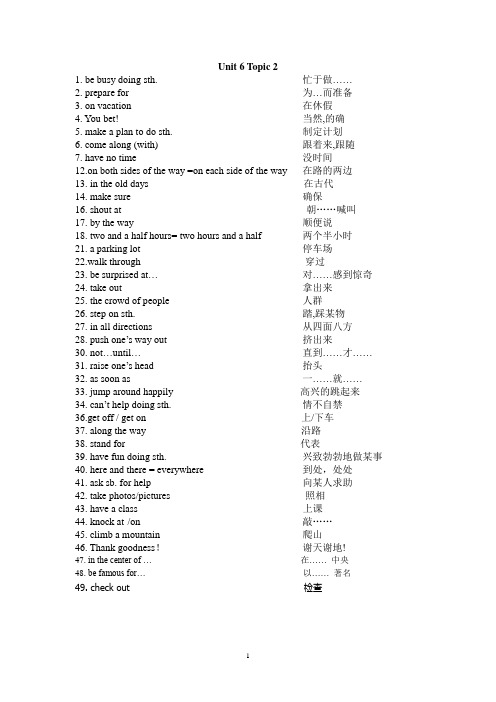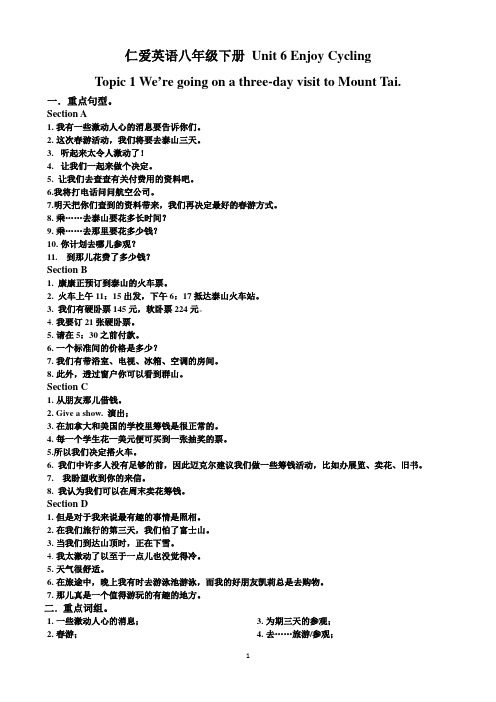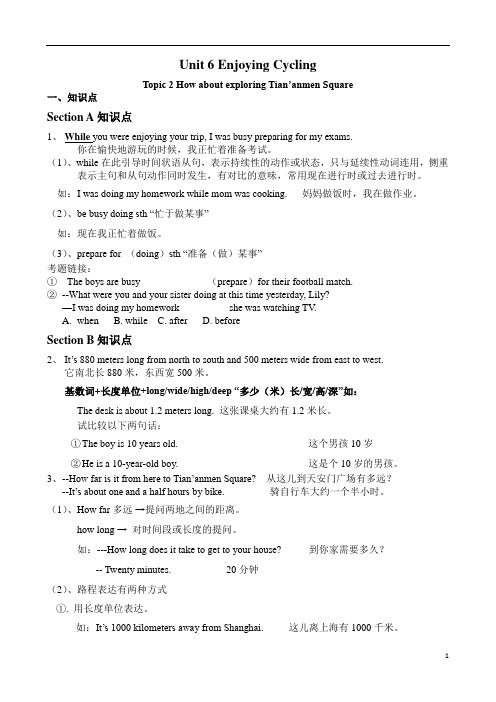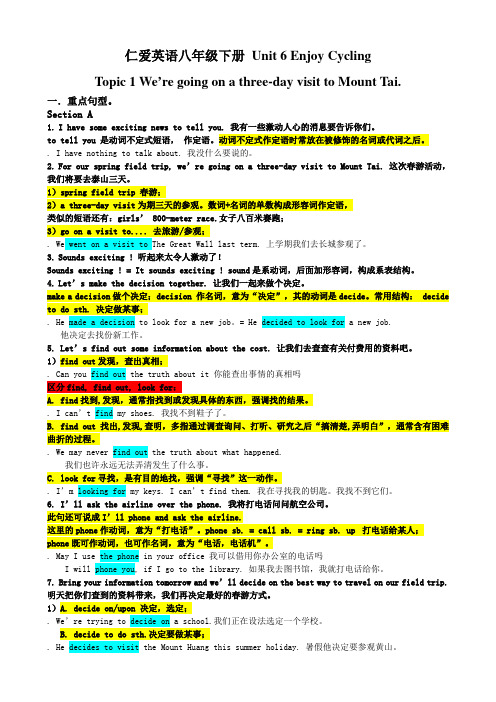2017年春季仁爱英语八年级下册 Unit 6 topic 2 重点知识点总结
- 格式:doc
- 大小:156.55 KB
- 文档页数:8

Unit 6 Topic 21. be busy doing sth. 忙于做……2. prepare for 为…而准备3. on vacation 在休假4. You bet! 当然,的确5. make a plan to do sth. 制定计划6. come along (with) 跟着来,跟随7. have no time 没时间12.on both sides of the way =on each side of the way 在路的两边13. in the old days 在古代14. make sure 确保16. shout at 朝……喊叫17. by the way 顺便说18. two and a half hours= two hours and a half 两个半小时21. a parking lot 停车场22.walk through 穿过23. be surprised at…对……感到惊奇24. take out 拿出来25. the crowd of people 人群26. step on sth. 踏,踩某物27. in all directions 从四面八方28. push one’s way out 挤出来30. not…until…直到……才……31. raise one’s head 抬头32. as soon as 一……就……33. jump around happily 高兴的跳起来34. can’t help doing sth. 情不自禁36.get off / get on 上/下车37. along the way 沿路38. stand for 代表39. have fun doing sth. 兴致勃勃地做某事40. here and there = everywhere 到处,处处41. ask sb. for help 向某人求助42. take photos/pictures 照相43. have a class 上课44. knock at /on 敲……45. climb a mountain 爬山46. Thank goodness!谢天谢地!47. in the center of … 在…… 中央48. be famous for… 以…… 著名49. check out 检查重点句型1. While you were enjoy your trip, I was busy preparing for my exam.2. I’d like you to meet him when he arrives.3. Would you help me make a plan to explore Beijing before he comes?4. That would be very interesting.5. It’s 880 meters long from nor to south and 500 meters wide from east to west.6. I can’t wait to see7. As they were exploring happily, more and more people came to the square.8. He was too worried to think about what to do.9. He didn’t raise his head until someone called him.10. As soon as the three boys saw each other, they all jumped around happily.11. It’s famous for beautiful mountains, forests and lakes.12. They were very cute and we couldn’t help watching them.13. While we were having fun exploring, I found that Darren was lost.14. I’d like to speak to Michael. 我想和Michael通话。

仁爱英语八年级下册Unit 6 Enjoy CyclingTopic 1 We’re going on a three-day visit to Mount Tai.一.重点句型。
Section A1.我有一些激动人心的消息要告诉你们。
2.这次春游活动,我们将要去泰山三天。
3.听起来太令人激动了!4.让我们一起来做个决定。
5. 让我们去查查有关付费用的资料吧。
6.我将打电话问问航空公司。
7.明天把你们查到的资料带来,我们再决定最好的春游方式。
8.乘……去泰山要花多长时间?9.乘……去那里要花多少钱?10.你计划去哪儿参观?11. 到那儿花费了多少钱?Section B1. 康康正预订到泰山的火车票。
2. 火车上午11:15出发,下午6:17抵达泰山火车站。
3. 我们有硬卧票145元,软卧票224元。
4.我要订21张硬卧票。
5.请在5:30之前付款。
6.一个标准间的价格是多少?7.我们有带浴室、电视、冰箱、空调的房间。
8.此外,透过窗户你可以看到群山。
Section C1.从朋友那儿借钱。
2.Give a show. 演出;3.在加拿大和美国的学校里筹钱是很正常的。
4.每一个学生花一美元便可买到一张抽奖的票。
5.所以我们决定搭火车。
6. 我们中许多人没有足够的前,因此迈克尔建议我们做一些筹钱活动,比如办展览、卖花、旧书。
7. 我盼望收到你的来信。
8. 我认为我们可以在周末卖花筹钱。
Section D1.但是对于我来说最有趣的事情是照相。
2.在我们旅行的第三天,我们怕了富士山。
3.当我们到达山顶时,正在下雪。
4.我太激动了以至于一点儿也没觉得冷。
5.天气很舒适。
6.在旅途中,晚上我有时去游泳池游泳,而我的好朋友凯莉总是去购物。
7.那儿真是一个值得游玩的有趣的地方。
二.重点词组。
1.一些激动人心的消息;2.春游;3.为期三天的参观;4.去……旅游/参观;5.太棒了!6.几天;7.做个决定;8.选择合适的交通工具;9.决定,选定;10.决定要做某事;11.打电话给某人;12.发现,查出真相;13.做……的最好方式;14.计划做某事;15.(为某事)制定计划;16.有一个计划;17.某物花了(某人)多少钱;做某事花了某人多少时间;付钱(给某人)买……;付……的钱;在……上花费时间(金钱);花费时间(金钱)做某事;18.爬山;19.野炊;20.英语角;21.去游泳;22.照相;23.为……订房间;24.火车站;25.在4月13日;26.硬卧;27.软卧;28.偿还,还钱(给某人);29.还清;30.电话号码;31.发车时间;32.到达时间;33.定一些房间;34.空调;35.带浴室的房间;36.看见群山;37.一间标间;38.两张单人床;39.一间单人房;40.一间双人标准间;41.一间标准单人间;42.筹钱;43.压岁钱;44.想某人要钱;45.从某人中借来某事物;46.把某物借给某人;47.演出,作秀;48.给某人展示;49.有很多特别的方式;50.想起;考虑;有……想法;51.移动电话;52.定特别的午餐;53.收集钱;54.在餐馆;55.火车;56.足够的钱;57.建议某人做某事;58.上演,上映;穿上;59.卖花;60.招募军队;61.养牛;62.种植玉米;63.期待,盼望;收到某人的来信、电话等。



Unit 6 Enjoying CyclingTopic 2 How about exploring Tian’anmen Square一、知识点Section A知识点1、While you were enjoying your trip, I was busy preparing for my exams.你在愉快地游玩的时候,我正忙着准备考试。
(1)、while在此引导时间状语从句,表示持续性的动作或状态,只与延续性动词连用,侧重表示主句和从句动作同时发生,有对比的意味,常用现在进行时或过去进行时。
如:I was doing my homework while mom was cooking. 妈妈做饭时,我在做作业。
(2)、be busy doing sth “忙于做某事”如:现在我正忙着做饭。
______________________________________(3)、prepare for (doing)sth “准备(做)某事”考题链接:①The boys are busy ____________ (prepare)for their football match.②--What were you and your sister doing at this time yesterday, Lily?—I was doing my homework _________ she was watching TV.A.whenB. whileC. afterD. beforeSection B知识点2、It’s 880 meters long from north to south and 500 meters wide from east to west.它南北长880米,东西宽500米。
基数词+长度单位+long/wide/high/deep “多少(米)长/宽/高/深”如:The desk is about 1.2 meters long. 这张课桌大约有1.2米长。

仁爱英语八年级下册Unit 6 Enjoy CyclingTopic 1 We’re going on a three-day visit to Mount Tai.一.重点句型。
Section A1.I have some exciting news to tell you. 我有一些激动人心的消息要告诉你们。
to tell you 是动词不定式短语,作定语。
动词不定式作定语时常放在被修饰的名词或代词之后。
. I have nothing to talk about. 我没什么要说的。
2.Fo r our spring field trip, we’re going on a three-day visit to Mount Tai. 这次春游活动,我们将要去泰山三天。
1)spring field trip 春游;2)a three-day visit为期三天的参观。
数词+名词的单数构成形容词作定语,类似的短语还有:girls’ 800-meter race.女子八百米赛跑;3)go on a visit to.... 去旅游/参观;. We went on a visit to The Great Wall last term. 上学期我们去长城参观了。
3.Sounds exciting ! 听起来太令人激动了!Sounds exciting ! = It sounds exciting ! sound是系动词,后面加形容词,构成系表结构。
4.Let’s make the decision together. 让我们一起来做个决定。
make a decision做个决定;decision 作名词,意为“决定”,其的动词是decide。
常用结构: decide to do sth. 决定做某事;. He made a decision to look for a new job。
= He decided to look for a new job.他决定去找份新工作。
八年级英语下册仁爱版Unit6 Topic1---3知识点(词汇、短语及语法)Unit 6 Topic 1一、重点词汇1、field 田地,2、trip 旅游,3、vehicle 车辆,4、airline 航班,5、raise 筹集,6、discuss 讨论,7、book 预定,8、railway 铁路,9、cinema 电影院,10、condition 条件,11、comfortable 舒适的,12、standard 标准的,13、draw 抽奖,画,14、land 着陆,土地二、重点短语:1 go on 继续go on a spring field trip 继续去春游go on a visit / trip to …=have a visit /trip to …2 decide on 致力于decide to do sth 决定做某事make a decision 决定3 My pleasure. = It’s a / my pleasure. 我很乐意4 Have a good trip. 玩得愉快Have a good / wonderful time.5 see the sunrise 看日出6 raise money 筹集钱make / earn money 赚钱save money节省钱7 book / order sth for sb 为某人预定...8 pay for 付...的钱9 make a reservation make a hotel reservation10 plan to do sth 计划做某事11 work out 解决work it / them out12 the cost of ......的花费the price of .......的价格13 come up with14 look forward to doing sth 盼望做某事15 hear from …= get / receive a letter from 收到...来信…16 in the day / daytime 在白天at night 在晚上in the evening 在晚上17 the sea of clouds 云海18 place of interest 有趣的地方三、重点语法动词不定式Help sb (to)do sth 帮助某人做某事(1) tell / ask / order / want / teach sb to do sth;例如:Mother told me not to play in the street. 妈妈告诉我,不要在马路上玩。
最新版仁爱英语八年级下Unit6语言点归纳Unit6 Enjoy CyclingTopic 1 We’re going on a spring field trip一、重点词汇(一)重点词组1. go on a spring field trip 去春游2. a two-day visit to Mount Tai 为期两天的泰山游3. make a decision 做出决定4. decide on sth. 对某事做出决定5. find out 查找;弄清6. book some tickets/rooms 预定车票/房间7. make hotel reservation 预定酒店房间8. the hard/soft sleeper 硬卧/软卧9. pay for 付款10. raise money 筹集资金11. come up with 产生;想出;赶上12. in the daytime 在白天13. at noon 在正午14. see the sunrise 看日出15. see the sea of clouds 看云海16. as soon as 一…就…17. place of interest 名胜古迹二. 重点句型及重点语言点1. We are going on a three-day visit to Mount Tai.three-day “三天的” , 这是带有数字的复合形容词,复合形容词用连字符号连接时,名词要用单数。
如:a 14-year-old boy 一个十四岁的男孩 a 100-meter race 一百米赛跑a two-day visit 为期两天的旅行2. It will take us a few days to get there by bike.take在此句中译成:“花费”.其句型是It takes sb +时间to do sth.eg:It took me half an hour to finish my homework last night.3. It’s too far to cycle.too…to…译成:太…不能….,.特别是to译成:不能.eg:The boy is too young to go to school4. We’ll decide on the best way to go on our field trip.make a decision = decide 做决定decide (not) to do sth. 决定(不)做某事decide on sth. 对某事做出决定eg:We must think over carefully before we make an important decision.I decided to make peace with him.5. You two find out the cost to go by train.cost 表“花费(金钱)”时,主语必须是事物。
Unit 6 - Topic 2 How about exploring the Ming Tombs?一. 重点单词A. 词汇1. 收到receive4. 完美的perfect7. 北方north10. 推push13. 注意,通告notice 16. 在……旁边beside 2.明信片postcard4.标明,做记号mark8.观光,旅行tour11.方向,方位direction14.视线sight17.卫兵,守卫guard3.野营camp6.东方的eastern9.空间space12.踩,脚步step15.巨大的huge18.认识到,实现realize二. 词形转换1. east (n.)– eastern (adj.)2. west (n.) – western (adj.)3. north (n.) -- northern (adj.)4. south (n.) -- southern (adj.)5. direct (n.) – director (n.) – direction (n.)6. crowd (n.) -- crowded (adj.)三. 重点短语1. be busy doing sth 忙着做某事2. tell good from bad 辨明是非3. come along with sb 和某人一起来4. be surprised at sth 对某事吃惊5. at the foot of 在……底部6. in different directions在不同的方向7. spread over 延伸,占地8. step on one’s toes踩了某人的脚9. the beginning / start of ……的开始10. out of sight 看不到11. on both sides of = on each side of 在……两边12. can’t help doing忍不住做某事13. two and a half hours = two hours and a half两个半小时14. on vacation 度假15. have fun doing sth 做某事很有趣16. thank goodness 谢天谢地17. make a plan to do sth 拟定计划做某事18. make sure 确信,确保19. be happy with 对……满意20. ask sb for help 向某人求助四. 语言点解析1. 时间状语从句A. 引导词:1) when, while, as(当……的时候)when可以引导延续性动词,也可引导非延续性动词(短暂性动词)。
Topic 2 How about exploring Tian’anmen Square?一.重点句型。
Section A1. I’d like to speak to Michael. 我想找迈克尔接电话。
打电话时的常用语。
也可以这样说:May I speak to Michael? 找迈克尔接电话好吗?e.g. Hello! May I speak to Helen? 你好!找海伦接电话可以吗?2.Glad to receive your postcard. 很高兴收到你的明信片。
这是一种简略的说法,完整的说法是:I’m glad to receive your postcard.类似的说法有:Nice to meet you. = I’m nice to meet you. 很高兴见到你。
3.While you were enjoying your trip to Mount Tai, I was busy preparing for my exams.当你在享受旅游泰山之乐时,我正忙着准备考试。
1)A. 这是一个由连词w h i l e 引导的时间状语从句。
当一个动作正在进行时,另一个动作也同时在发生,有对比的意味,一般主从句都用现在进行时或过去进行时。
e.g. I was doing my homework while mom was cooking. 妈妈做饭时,我在做作业。
B. 时间状语从句可以放在主句之前,也可以放在主句之后。
e.g. While mom was cooking, I was doing my homework. 妈妈做饭时,我在做作业。
需要注意的是:从句在前面时,主从句之间要用逗号隔开。
2)be busy doing sth.忙于做某事,后面还可接名词,即be busy with sth.忙于某事。
e.g. I am busy doing my homework. = I am busy with my homework. 我忙于做作业。
3)prepare for(doing)sth 准备(做)某事;e.g. The students are preparing for the coming exams. 学生正在准备即将到来的考试。
4.I’m looking forward to meeting him. 我盼着与他见面。
look forward to 意为“期待,盼望”,to 是介词,后面可加名词、代词或动名词;e.g. He is looking forward to going abroad. 他期待去国外。
5.Would you help me make a plan to explore Beijing before he comes? 在他来之前,你能帮我制订一个探索北京的计划吗?1)Would you 比will you 语气更加客气,委婉, 类似还有:could you.......?e.g. Could you come along with us ? 你要和我们一起吗?2)A. make a plan to do sth.制订计划做某事;e.g. The boy made a plan to visit around the world. 男孩制订了一个环游全世界的计划。
B. make a plan for sth.为某事制订计划;e.g. I made a plan for my summer vacation. 我为我的暑假制订了一个计划。
3)explore 动词,意为“考察(某地区),探险,勘察”;e.g. He went out to explore.他出去考察了。
扩展:explorer 名词,意为“探险家,探测者”;e.g. She want to be an explorer when she grows up. 当她长大后,她想成为一名探险家。
6. That would be very interesting. 那将会很有趣。
would意为“一定会;就会”,是情态动词,后接动词原形,表示猜测。
e.g. She would look nice with short hair. 她留短发会很好看。
7.Would you help me plan a trip ? 请你帮我定个旅行计划好吗?1)A. Would 与you 连用表示请求或要求;won’t you加强邀请的语气。
但would 比will 语气更加客气,委婉。
e.g. Will you come this way, please? 请这边走好吗?Won’t you coming in and take a seat? 你怎么不进来找个位子坐下?B. Will you....? 和Would you....? 在表达“请求”时用法完全一样,其答语也相同。
只是后者更有礼貌。
e.g. —Will /Would you have some more tea? 再喝点茶,好吗?—Yes, please. 好的。
/ No, thank you. 不,谢谢。
2)trip 作可数名词,意为“旅行,旅程”。
动词短语plan a trip 意为“制定旅行计划”。
8.Could/ Can you come along with us? 你和我们一起来好吗?1)在表达请求别人做某事常用can/ could,could 更礼貌。
肯定回答时用:can/may, 不用could。
e.g. —Could/ Can I ask you a question, Mr. Lee?李老师,我可以问你一个问题吗?—Yes, of course you can. 当然可以。
2)come along (with) 意为“跟着来,跟随”;e.g. Ray had some work to finish and decided to come along later. 雷还有些工作要做完,决定迟点儿再来。
9.Shall we take him here?我们带他去那儿好吗?A.shall和will 都用与一般将来时,但shall 只用于第一人称。
e.g. I shall/ will buy a computer this Sunday. 这个礼拜天我将买一台电脑。
B.Shall we/I.....?表示向对方征求意见,提出建议,意为“……好吗?”e.g. Shall we go swimming tomorrow? 我们明天去游泳好吗?10.Darren was reading a newspaper when Michael came in. 当迈克尔进来时,达伦正在看报纸。
此句也可以改成:Michael came in when/while Darren was reading a newspaper.while引导的时间状语从句,用于表达持续性的动词或状态,不能与表示短暂性动词连用,但when两者皆可以。
11.Diana and Lily should work out the cost carefully for the holiday. 戴安娜和莉莉为假期应该仔细计算费用。
work out 算出,解决,计算出,找出……的答案;e.g. Can you work out the problem?你能解决这个问题吗?Section B1.It covers 440000 square meters. 它占地面积为44万平方米。
1)cover 动词,有多层含义:a)掩饰,遮盖;e.g. She covered her face with her hands. 她双手掩面。
b)覆盖;e.g. Snow covered the ground. 大雪覆盖了大地。
c)占(一片面积);e.g. Our school covers about 1000 square meters. 我们学校占地大约一千平方米。
2)square meter 平方米;2.It’s 880 meters long from north to south and 500 meters wide from east to west.它南北长880米,东西宽500米。
1)880 meters long 880米长;类似结构有:10 meter high/wide/deep 10米高/宽/深;基数词+长度单位+long/wide/high/deep 意为:“多少(米)长/宽/高/深”;e.g. The desk is about 1.2 meters long. 这张课桌大约有1.2米长。
试比较以下两句话:The boy is 10 years old. 这个男孩10岁He is a 10-year-old boy.这是个10岁的男孩。
2)from ..... to...... 从……到……;3.It can hold one million people. 可以容纳100万人。
a)hold在此处意为“容纳,包含”;e.g. The plane holds about 300 passengers.这架飞机可容纳大约300个乘客。
b)hold还可表示“拿着,抓住,抱住”;e.g. She was holding the baby in her arms.她抱着婴儿。
c)hold 还可意为:“举行进行”;e.g. Beijing is holding the 9th International Garden Expo.北京正在举行第九届国际园艺博览会。
4.The square must be quite meaningful to all Chinese people. 这个广场对于所有的中国人来说一定意义重大。
a)must在此处表示推测,意为“一定是,准是”,语气较肯定。
e.g. The light is on. She must be at home. 灯亮着,她一定在家。
b)may表示推测时可能性较小。
e.g. It may rain tomorrow. 明天可能会下雨。
c)can表示推测时,多用于否定句或疑问句。
e.g.That can't be Mary—She's in hospital. 那不可能是玛丽。
她在住院。
5.I can’t wait to see it. 我迫不及待地想看了。
can't wait to do sth.迫不及待地做某事;e.g. He couldn't wait to open the box. 他迫不及待地打开盒子。
6.How far is it from here to Tian’anmen Square?这里离天安门广场多远?1)How far is it from A to B?……多远?提问两地之间的距离。